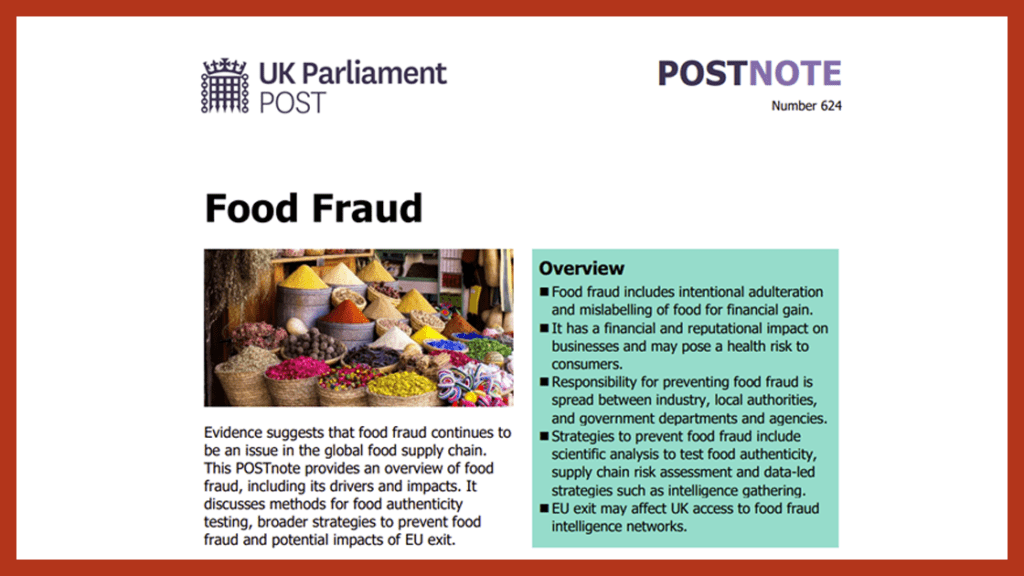This is an important report since it is the UK Parliament providing insight to their Members of Parliament. This is a foundation document that presents the UK Parliament’s thinking – and possible direction – regarding food fraud public policy setting. The report emphasized prevention, public-private collaboration, and building upon vulnerability assessments.
For those of you who are not familiar with the UK Parliament POSTNOTE reports, these are research briefings similar to the US Congressional Research Service reports that are requested and published for the US Congress. “POST is an office of both Houses of Parliament, charged with providing independent and balanced analysis of policy issues that have a basis in science and technology.”
I spent quite a bit of time discussing the content with their researcher, and it ended up that eight of my research publications were cited in their report.
I was listed in the report as an external reviewer (“Dr John Spink, Michigan State University”). Other reviewers who I’ve worked with before include: Dr James Donarski, Fera Science; Dr Michael Walker, Office of the Government Chemist, LGC; Dr Sophie Rollinson, Defra; Giles Chapman, National Food Crime Unit; John Points, Consultant Analytical Scientist; Liz Moran, Public Analyst Scientific Services; Professor Chris Elliott, Institute for Global Food Security, Queen’s University Belfast; Professor Lisa Jack, University of Portsmouth; Professor Louise Manning, Royal Agriculture University; Professor Nicholas Lord, University of Manchester; Selvarani Elahi, Office of the Government Chemist, LGC and Food Authenticity Network; among others.
The POSTNOTE report provides the following overview of food fraud and recommendations for the UK Government:
- Food fraud includes intentional adulteration and mislabelling of food for financial gain.
- Food fraud has a financial and reputational impact on businesses and may pose a health risk to consumers.
- Responsibility for preventing food fraud is spread among industry, local authorities, and government departments and agencies.
- Strategies to prevent food fraud include scientific analysis to test food authenticity, supply chain risk assessment and data-led strategies such as intelligence gathering.
- The UK leaving the EU (Brexit) may affect UK access to food fraud intelligence networks.
The report provided a summary of key applications, such as the foundation of their recommendations that build upon first starting with vulnerability assessments:
- “Vulnerability Assessments: Businesses can carry out vulnerability assessments to identify potential areas of fraud vulnerability in their supply chains. Assessments consider factors such as the type of and demand for ingredients, the known potential for fraud of specific types of products and ingredients, and the strength of a company’s food fraud mitigation strategy.”
Conclusion
While this Food Fraud POSTNOTE report is a summary document, it is interesting and important to review how a government summarizes a topic. For food fraud prevention, it is important for industry and researchers to understand where there is a clear understanding and where there is a need for more clarity of the ideas. Fortunately, the UK Parliament POSTNOTE provides a summary that is consistent with the most widely adopted food fraud prevention concepts. Use this report as a summary of food fraud prevention and also for an awareness of the focus of the UK Government.
- Reference: U.K. Parliament Post, (2020). Food Fraud, The Parliamentary Office of Science and Technology, Westminster, London, Number 624, URL: https://post.parliament.uk/research-briefings/post-pn-0624/

